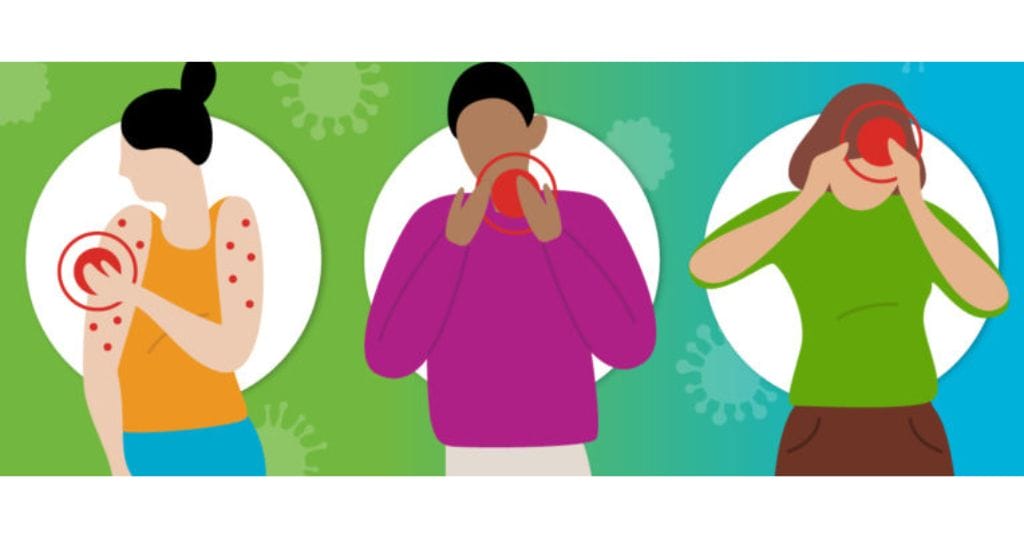Monkeypox is a virus that can affect anyone. As cases start to rise, you may have questions about a monkeypox outbreak.
What is monkeypox?
Monkeypox is a viral infection. Pox-related infections are nothing new. For example, chickenpox is something that most people have seen or had themselves. What makes a pox virus is the raised skin lesions that go along with the virus.
This virus was actually first recognized in a study with monkeys in the 1950s and the first human cases were recorded in the 1970s.
Is monkeypox deadly?
For most people, it isn’t a life-threatening disease and symptoms will last from two to four weeks. However, it can lead to more serious illnesses like pneumonia or encephalitis (brain swelling or infection), particularly in people with poor immune systems, pregnant people and children 8 and under.
Is monkeypox contagious?
Yes, it’s contagious. However, it’s not an airborne disease. Because of the way monkeypox spreads, it’s not as contagious as other viruses, such as COVID-19. The risk level for the general population is low.
How does monkeypox spread?
Transmission can occur from person-to-person or from an animal to a person. According to the Centers for Disease Control and Prevention (CDC), monkeypox spreads through “close, personal, often skin-to-skin contact.”
The virus can spread by:
- Direct close personal/intimate (including sexual) contact with the infectious rash, scabs or body fluids
- Respiratory secretions during prolonged, face-to-face contact, or during intimate contact
- Touching infected animals, of meat, bodily fluids secretions or products made from infected animals
- Touching clothing, bedding or objects that have touched a sick animal or person
- From a woman who’s infected to her baby in-utero through the placenta
It’s important to contain monkeypox so it doesn’t spread among animals that easily transmit viruses.
This virus spreads very differently than COVID-19. Where COVID-19 spreads through droplets in the air that travel fast and wide, the monkeypox virus spreads through very close contact with a person who’s actively infected.
What are monkeypox symptoms?
The virus is associated with flu-like symptoms. Symptoms usually appear one to two weeks after initial exposure and can last five days to three weeks. The most common symptoms include:
- Fever
- Chills
- Headache
- Muscle weakness aches
- Fatigue
- Painful rash with blisters
- Swollen lymph nodes
What does monkeypox look like?
Monkeypox looks like pimples or blisters that appear on the face, inside the mouth and on other parts of the body, like the hands, feet, chest, genitals or anus.
Can my pet get monkeypox?
Rodents – like rats, mice and rabbits – are the most likely to be affected. If you’re infected with the virus, isolate yourself from pets as a safety precaution.
Is there a vaccine for monkeypox?
Yes, there is an FDA-approved vaccine. The vaccine can prevent and cure the virus.
Monkeypox is known as a zoonosis. That means it was an infectious agent that originated with animals and spread to humans. Many viruses start out this way, which means we already have a proven and safe monkeypox vaccine that is effective at preventing the spread of the virus. These types of vaccines have been used for many decades.
Federal health officials recently declared monkeypox a public health emergency. As a result, the vaccine and drug treatments will likely become more widely available as production ramps up. There is limited supply in the United States, and supply is managed by the CDC and the state health departments.
Other disease prevention tips are recommended: wash hands with warm water and soap for 20 seconds, avoid people who may be infected with the virus and disinfect frequently touched areas.
How do I know if I have monkeypox?
If you had a known exposure or have the characteristic rash, contact your primary care provider and your local health department. Diagnoses are being monitored by the health department and the CDC.
What do I do if I get monkeypox?
Symptoms of monkeypox can be alleviated with over-the-counter medications like fever reducers and pain relievers. If you have a rash or skin legions, soaking in a warm bath with oatmeal can help alleviate the itch.
As with any illness, take other necessary precautions:
- Get plenty of rest and fluids
- Isolate yourself from others
- Stay home from work or school
If you’re infected and have a lasting fever or swollen lymph nodes, call your health care provider. If you experience trouble breathing, a stiff neck or chest pain, go to your nearest emergency department.
What should I do if I have a family member with monkeypox who I need to take care of?
If for some reason a household member has to take care of an individual with monkeypox, taking some common sense precautions can minimize the risk of infection:
- Wear face masks – both the patient and the household member – when in each other’s presence.
- Use disposable gloves for direct contact with lesions, followed by either using hand sanitizer or washing hands with soap and water if visibly soiled.
- Regularly wash hands or use hand sanitizer.
- Use caution when handling soiled laundry to avoid direct contact with contaminated material. Soiled laundry should not be shaken or otherwise handled in a manner that may disperse infectious particles. Laundry may be washed in a standard washing machine with water and detergent.
- Consult with state or local health officials about how to dispose of contaminated waste (such as dressings and bandages).
This article originally appeared on OSF Healthcare.






